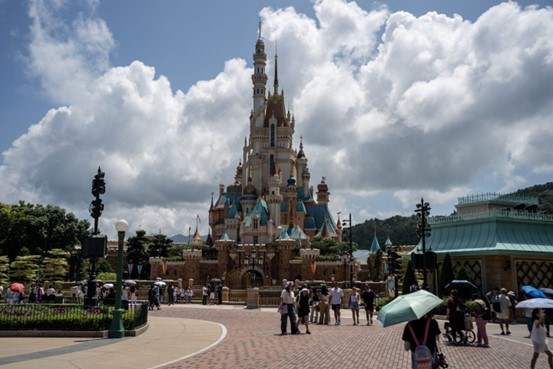
今年第三季度,迪士尼(Disney)恢复盈利,其流媒体业务首次开始盈利,而电影《头脑特工队2》(Inside Out 2)的票房表现不俗。
包括电影公司和部分电视业务在内的娱乐部门,营业收入增长近两倍达到12亿美元。电影《死侍与金刚狼》(Deadpool & Wolverine)的票房成绩继续高歌猛进,这是迪士尼今年的第二部票房冠军电影。
华特迪士尼公司周三表示,其直销业务,包括Disney+和Hulu,季度营业损失为1,900万美元,远低于一年前的5.05亿美元亏损。收入增长15%达到58.1亿美元。
在业绩公布的前一天,迪士尼表示将从10月7日起提高Disney+、Hulu和ESPN+的价格。带广告版的Disney+和Hulu每月订阅费将分别为9.99美元,分别上涨了2%。无广告版的Disney+每月订阅费为15.99美元,将上涨2美元,而无广告版Hulu的订阅费将上涨1美元,每月18.99美元。仅提供带广告订阅的ESPN+,每月的订阅费将上涨1美元,达到11.99美元。
截至6月29日,迪士尼的收益为26.2亿美元,相当于每股1.43美元。一年前,迪士尼亏损4.6亿美元,相当于每股25美分。
去掉一次性收益,迪士尼的每股收益为1.39美元,远超过扎克斯投资研究公司(Zacks Investment Research)调查的分析师预测的1.20美元。
位于加州伯班克的迪士尼,营收增长4%达到231.6亿美元,超出了华尔街预估的229.1亿美元。
主题乐园业务低迷
在早盘交易中,迪士尼股价面临压力,因为其美国国内主题乐园表现出一些疲软的迹象。其国内主题乐园隶属于体验部门,该部门还包括全球六座主题乐园、邮轮公司、商品和视频游戏许可等业务。迪士尼警告称,美国主题乐园需求低迷,可能拖累未来几个季度的业绩。
迪士尼预测,由于国内主题乐园需求低迷和中国市场的周期性疲软,以及巴黎奥运会对普通消费者旅游的影响导致巴黎迪士尼游客减少,体验部门第四季度的营业收入与去年同期相比将下降中等单位数。
在迪士尼的电话会议上,约翰斯顿表示,低收入消费者感受到财务压力,而高端消费者正在更多地出国旅游,这对美国的国内主题乐园业务造成了影响。国内主题乐园和体验部门的营业收入减少6%,国外主题乐园和体验部门的营业收入增长了2%。
第三季度,美国国内主题乐园的营收增长3%,而国际主题乐园营收增长了5%。
迪士尼表示,通货膨胀、技术支出和新游客服务等因素导致的成本上涨,使国内主题乐园与体验部门的营业收入减少。
得益于电影《头脑特工队2》出色的票房成绩,迪士尼通过内容销售和许可获得的营业收入达到2.54亿美元。目前,《头脑特工队2》的全球总票房超过15亿美元,成为有史以来票房最高的动画电影。
迪士尼在周三表示,2015年上映的《头脑特工队》使Disney+的注册用户数量增加了130万以上,而且自从《头脑特工队2》首部预告片发布以来,第一部的全球观看量超过1亿次。
过去一个季度,ESPN+表现强劲,直销部门的季度业绩超出预期,因此包括Disney+、Hulu和ESPN+在内的流媒体业务,首次实现盈利。
迪士尼CEO鲍勃·艾格和高级执行副总裁兼首席财务官休·约翰斯坦在提前准备好的发言中表示,在18至49岁成年人中,ESPN第三季度在黄金时段的收视率达到历史最高水平。这是由于多个领域吸引了大量观众,包括NBA总决赛、WNBA选秀和NHL季后赛以及斯坦利杯总决赛等。
迪士尼曾在5月表示,受到印度平台Disney+Hotstar的影响,第三季度其流媒体业务总体业绩将趋于疲软。迪士尼当时还表示,预计整体流媒体业务将在第四季度实现盈利,因此第三季度就实现盈利是一个意外惊喜。
目前,迪士尼预计全年调整后每股收益增长率为30%。
今年4月,迪士尼股东断然拒绝了激进投资者纳尔逊·佩尔茨试图获得董事会席位的主张,而是坚定地支持艾格。在迪士尼经历过一段艰难时期之后,艾格正在努力振兴公司。
此前,佛罗里达州州长罗恩·德桑蒂斯任命的官员批准了与迪士尼的一项协议,其中规定了未来二十年华特迪士尼乐园的开发计划。今年6月,迪士尼向联邦上诉法院申请撤回对德桑蒂斯的诉讼,由此结束了双方之间最后的争议。
在这项为期15年的协议中,迪士尼同意未来二十年在迪士尼乐园投资170亿美元,而政府承诺完善主题乐园度假村物业上的基础设施。(财富中文网)
译者:刘进龙
审校:汪皓
今年第三季度,迪士尼(Disney)恢复盈利,其流媒体业务首次开始盈利,而电影《头脑特工队2》(Inside Out 2)的票房表现不俗。
包括电影公司和部分电视业务在内的娱乐部门,营业收入增长近两倍达到12亿美元。电影《死侍与金刚狼》(Deadpool & Wolverine)的票房成绩继续高歌猛进,这是迪士尼今年的第二部票房冠军电影。
华特迪士尼公司周三表示,其直销业务,包括Disney+和Hulu,季度营业损失为1,900万美元,远低于一年前的5.05亿美元亏损。收入增长15%达到58.1亿美元。
在业绩公布的前一天,迪士尼表示将从10月7日起提高Disney+、Hulu和ESPN+的价格。带广告版的Disney+和Hulu每月订阅费将分别为9.99美元,分别上涨了2%。无广告版的Disney+每月订阅费为15.99美元,将上涨2美元,而无广告版Hulu的订阅费将上涨1美元,每月18.99美元。仅提供带广告订阅的ESPN+,每月的订阅费将上涨1美元,达到11.99美元。
截至6月29日,迪士尼的收益为26.2亿美元,相当于每股1.43美元。一年前,迪士尼亏损4.6亿美元,相当于每股25美分。
去掉一次性收益,迪士尼的每股收益为1.39美元,远超过扎克斯投资研究公司(Zacks Investment Research)调查的分析师预测的1.20美元。
位于加州伯班克的迪士尼,营收增长4%达到231.6亿美元,超出了华尔街预估的229.1亿美元。
主题乐园业务低迷
在早盘交易中,迪士尼股价面临压力,因为其美国国内主题乐园表现出一些疲软的迹象。其国内主题乐园隶属于体验部门,该部门还包括全球六座主题乐园、邮轮公司、商品和视频游戏许可等业务。迪士尼警告称,美国主题乐园需求低迷,可能拖累未来几个季度的业绩。
迪士尼预测,由于国内主题乐园需求低迷和中国市场的周期性疲软,以及巴黎奥运会对普通消费者旅游的影响导致巴黎迪士尼游客减少,体验部门第四季度的营业收入与去年同期相比将下降中等单位数。
在迪士尼的电话会议上,约翰斯顿表示,低收入消费者感受到财务压力,而高端消费者正在更多地出国旅游,这对美国的国内主题乐园业务造成了影响。国内主题乐园和体验部门的营业收入减少6%,国外主题乐园和体验部门的营业收入增长了2%。
第三季度,美国国内主题乐园的营收增长3%,而国际主题乐园营收增长了5%。
迪士尼表示,通货膨胀、技术支出和新游客服务等因素导致的成本上涨,使国内主题乐园与体验部门的营业收入减少。
得益于电影《头脑特工队2》出色的票房成绩,迪士尼通过内容销售和许可获得的营业收入达到2.54亿美元。目前,《头脑特工队2》的全球总票房超过15亿美元,成为有史以来票房最高的动画电影。
迪士尼在周三表示,2015年上映的《头脑特工队》使Disney+的注册用户数量增加了130万以上,而且自从《头脑特工队2》首部预告片发布以来,第一部的全球观看量超过1亿次。
过去一个季度,ESPN+表现强劲,直销部门的季度业绩超出预期,因此包括Disney+、Hulu和ESPN+在内的流媒体业务,首次实现盈利。
迪士尼CEO鲍勃·艾格和高级执行副总裁兼首席财务官休·约翰斯坦在提前准备好的发言中表示,在18至49岁成年人中,ESPN第三季度在黄金时段的收视率达到历史最高水平。这是由于多个领域吸引了大量观众,包括NBA总决赛、WNBA选秀和NHL季后赛以及斯坦利杯总决赛等。
迪士尼曾在5月表示,受到印度平台Disney+Hotstar的影响,第三季度其流媒体业务总体业绩将趋于疲软。迪士尼当时还表示,预计整体流媒体业务将在第四季度实现盈利,因此第三季度就实现盈利是一个意外惊喜。
目前,迪士尼预计全年调整后每股收益增长率为30%。
今年4月,迪士尼股东断然拒绝了激进投资者纳尔逊·佩尔茨试图获得董事会席位的主张,而是坚定地支持艾格。在迪士尼经历过一段艰难时期之后,艾格正在努力振兴公司。
此前,佛罗里达州州长罗恩·德桑蒂斯任命的官员批准了与迪士尼的一项协议,其中规定了未来二十年华特迪士尼乐园的开发计划。今年6月,迪士尼向联邦上诉法院申请撤回对德桑蒂斯的诉讼,由此结束了双方之间最后的争议。
在这项为期15年的协议中,迪士尼同意未来二十年在迪士尼乐园投资170亿美元,而政府承诺完善主题乐园度假村物业上的基础设施。
迪士尼股价在早盘交易中下跌超过2%。(财富中文网)
译者:刘进龙
审校:汪皓
Disney returned to a profitable third quarter as its combined streaming business started making money for the first time, along with a very strong showing in theaters for the movie “Inside Out 2.”
Operating income for the entertainment segment, which includes its movie studio and parts of its television wing, nearly tripled to $1.2 billion. Disney’s run at the box office continues with “Deadpool & Wolverine,” giving the company the top two films of the year.
The Walt Disney Co. said Wednesday that its direct-to-consumer business, which includes Disney+ and Hulu, reported a quarterly operating loss of $19 million, which was much smaller than its loss of $505 million a year earlier. Revenue climbed 15% to $5.81 billion.
The results were announced a day after Disney said that it will be boosting prices for Disney+, Hulu and ESPN+, starting on Oct. 17. Disney+ and Hulu will each cost $9.99 a month with ads, a $2 increase for each plan. The ad-free version of Disney+ will run $15.99 monthly, a $2 uptick, while Hulu will be $1 more, at $18.99 monthly for the ad-free version. ESPN+, which is only available with ads, will have a monthly cost of $11.99, a $1 increase.
Disney earned $2.62 billion, or $1.43 per share for the period ended June 29. A year earlier it lost $460 million, or 25 cents per share.
Stripping out one-time gains, earnings were $1.39 per share, easily topping the $1.20 analysts polled by Zacks Investment Research expected.
Revenue for the Burbank, California, company rose 4% to $23.16 billion, beating Wall Street’s estimate of $22.91 billion.
Theme parks aren’t so hot
Disney’s stock was pressured in early trading with some weakness showing in domestic parks, part of its Experiences division that includes six global theme parks, its cruise line, merchandise and videogame licensing. The company cautioned that the moderation in demand it saw at U.S. parks could linger for the next few quarters.
It anticipates fourth-quarter Experiences operating income falling by mid single digits compared with the prior-year period due to the domestic parks moderation as well as cyclical softening in China and less people at Disneyland Paris due to the impact the Olympics had on normal consumer travel.
Johnston said during the company’s conference call that the parks have been impacted by lower-income consumers feeling more financial stress, while higher-end consumers are doing a bit more international travel now. Domestic parks and Experiences operating income fell 6%, thought international parks and experiences operating income edged up 2%.
Revenue for domestic parks climbed 3% in the third quarter. International parks revenue rose 5%.
Disney said that the decline in operating revenue for domestic parks and experiences was because of increased costs driven by inflation, technology spending and new guest offerings.
The company made $254 million in operating income from content sales and licensing helped by the strong performance of “Inside Out 2” in theaters, which is now the highest-grossing animated film of all time, with more than $1.5 billion generated globally.
Disney said Wednesday that the original “Inside Out,” which came out in 2015, helped drive more than 1.3 million Disney+ sign-ups and generated over 100 million views worldwide since the first Inside Out 2 teaser trailer dropped.
The combined streaming businesses, which includes Disney+, Hulu and ESPN+, achieved profitability for the first time thanks to a strong three months for ESPN+ and a better-than-expected quarterly performance from the direct-to-consumer unit.
CEO Bob Iger and Senior Executive Vice President and Chief Financial Officer Hugh Johnston said in prepared remarks that ESPN had its most watched third quarter in primetime in a decade among adults age 18-49. This was due to strong viewership in several areas, including the NBA finals, WNBA draft and NHL playoffs and Stanley Cup finals.
Disney said in May that it expected its overall streaming business to soften in the third quarter due to its platform in India, Disney+Hotstar. The company also said at the time that it anticipated its combined streaming businesses to be profitable in the fourth quarter, so the money-making quarter was a surprise.
Disney now anticipates full-year adjusted earnings per share growth of 30%.
In April shareholders rebuffed efforts by activist investor Nelson Peltz to claim seats on the company board, standing firmly behind Iger as he tries to energize the company after a rough stretch.
In June Disney asked a federal appellate court to dismiss its lawsuit against Florida Gov. Ron DeSantis after his appointees approved a deal with the company on how Walt Disney World will be developed over the next two decades, ending the last piece of conflict between the two sides.
As part of the 15-year deal, Disney agreed to invest $17 billion into Disney World over the next two decades and the district committed to making infrastructure improvement on the theme park resort’s property.
Shares fell more than 2% in early trading.






